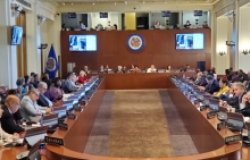Political, Social, and Religious Change in Chiapas
Overview
Summary of a meeting with Jean Meyer, Professor of History, CIDE, Mexico City and Xochitl Leyva, Professor of Anthropology, CIESAS-Sureste, Chiapas.
The conflict in Chiapas, Mexico's poorest state, aroused international interest when hundreds of indigenous peasants briefly took over several towns in Chiapas in 1994 and declared war on the Mexican government. Within twelve days the government and the rebels agreed on a cease fire and intermittent peace negotiations took place. The peace negotiations have broken down since 1996, however, and although no one expects an outright war, the conflict continues to simmer with no certain outcome ahead. The Wilson Center hosted a seminar with two well-respected Mexican scholars to discuss the origins and current state of the conflict. Jean Meyer discussed the effect of religious groups on the origins of the conflict; Xochitl Leyva discussed the aftermath of the conflict and the government's response.
Jean Meyer described the influence of the Catholic and Protestant Churches on the changes that led to the rebellion in Chiapas. He argued that in the indigenous communities of Chiapas, conversion to Protestantism had become a way of avoiding oppressive conditions of authoritarian leaders. Those who became Protestant (now 23% of the population) were no longer bound to follow the traditions of the community, including following the mandates of community leaders. This had generated a series of internal conflict within communities and younger generations had joined Protestant churches. Many of the converts had been forced to move to new communities to avoid reprisals. Protestantism had arrived in Chiapas largely through the churches in Guatemala, rather than through U.S. or European churches.
Bishop Samuel Ruíz, who arrived in Chiapas in the 1960s to take charge of the largely indigenous diocese of San Cristóbal, also saw a liberating potential in the Catholic church. However, his vision was, according to Meyer, highly conservative, contrary to much that has been written. Bishop Ruíz believed in a return to an indigenous Catholicism that respected native traditions and ways of worship. He empowered hundreds of indigenous deacons to conduct services throughout the communities. In doing so, the Catholic Church empowered hundreds of local indigenous peasants who became "biblically literate" and challenged the authority of traditional leaders. While neither the Catholic Church nor the Protestant churches sought to encourage revolutionary change, their religious activities empowered a new generation of leaders within the indigenous communities who were then able to choose a variety of diverse options that included pro-government organizations, independent organizations, and the Zapatista rebel army. The churches did not contribute directly to the rebellion, but they helped break the rigid structure of Chiapas society and allow for the emergence of different options, including that of the guerrillas.
Xochitl Leyva described the Chiapas government's attempts to create new municipalities as a strategy of "counter-insurgency" against the support networks of the Zapatistas. One of the principal demands of the Zapatista rebels, which was agreed by both parties in the peace process negotiations, was the creation of new municipalities. To a large extent, the Zapatistas sought to consolidate their own bases of support within new municipalities; however, this was also a demand of a number of the indigenous communities that wanted to govern themselves according to their own internal governance structures. After the breakdown of the peace negotiations, the government created a series of new municipalities in areas that were dominated by their own supporters without consultation with the rebels. This was seen as an attempt to shore up support for pro-government organizations and undercut support for the Zapatistas. Leyva argued that this strategy backfired since the creation of new municipalities actually broke down traditional structures that tied the communities to the government and aided the emergence of opposition groups. This contributed, in turn, to the defeat of the party (PRI) that had governed Chiapas for over seven decades, in the elections held in 2000.
The current government, which is supported by a broad but loose coalition of opposition parties has sought to establish a new relationship with the indigenous communities. However, Leyva noted that the decision of the Zapatistas not to communicate with the government and the great distrust of many communities toward the government after years of conflict has made it difficult to advance in this process.
by Andrew Selee
Hosted By

Latin America Program
The Wilson Center’s prestigious Latin America Program provides non-partisan expertise to a broad community of decision makers in the United States and Latin America on critical policy issues facing the Hemisphere. The Program provides insightful and actionable research for policymakers, private sector leaders, journalists, and public intellectuals in the United States and Latin America. To bridge the gap between scholarship and policy action, it fosters new inquiry, sponsors high-level public and private meetings among multiple stakeholders, and explores policy options to improve outcomes for citizens throughout the Americas. Drawing on the Wilson Center’s strength as the nation’s key non-partisan policy forum, the Program serves as a trusted source of analysis and a vital point of contact between the worlds of scholarship and action. Read more
Thank you for your interest in this event. Please send any feedback or questions to our Events staff.










